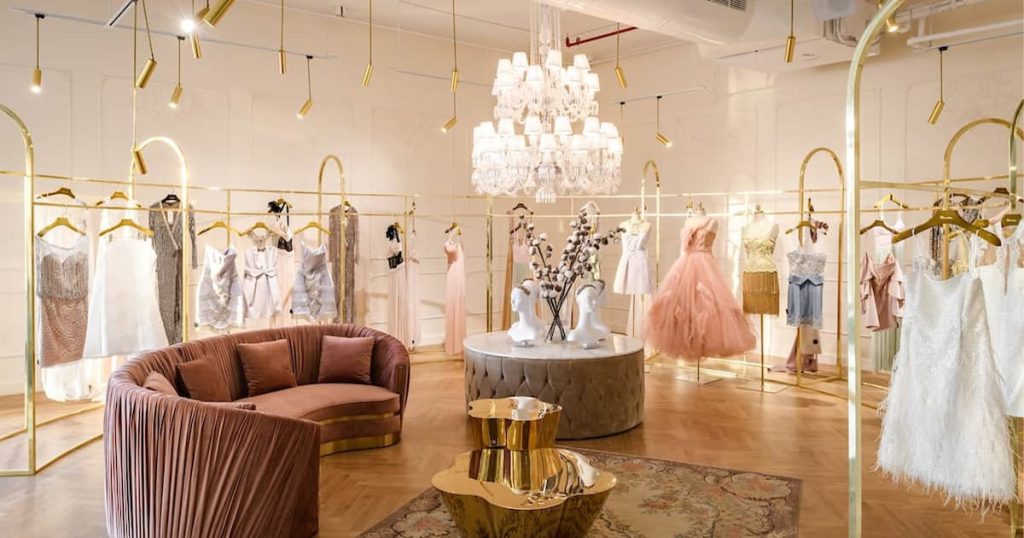Over the past decade, a handful of African multi-brand stores have cemented their position as go-to destinations for luxury. From Alara and Temple Muse in Lagos, to Apsley and Merchants On Long in Cape Town, well-known stores have become key brand partners on the continent. But beyond the swish boutiques of Nigeria and South Africa — sub-Saharan Africa’s two largest economies — a new wave of retailers is taking advantage of luxury’s limited footprint.
The absence of flagships from LVMH, Kering and Richemont brands across much of the region — combined with delivery constraints from e-tailers like Net-a-Porter and Mytheresa — has created opportunities for African entrepreneurs looking to give big spenders immediate access to designer brands.
Not all are new ventures. In some African cities, family dynasties have been importing luxury goods for generations.
Take the Kenyan merchants behind Little Red, a household name in the wealthy neighbourhoods of Nairobi where it is considered a market leader. “To my knowledge, Little Red is the only one of its kind to have the footprint that it has [in the East Africa sub-region],” says Kenyan stylist and curator Sunny Dolat, adding that elite clients fly in from neighbouring countries just to visit the boutique, which has sold big brands for decades.
Today, the retailer stocks Etro, Michael Kors and Bally among others and, until recently, it was run jointly by third-generation director Karim Fazal and his brother Aziz Fazal. The pair have since split the family business with Aziz now operating Fazal, a second luxury multi-brand chain in Nairobi which offers brands like Zegna, Armani and Escada.
“It’s a very personal [relationship] that we have with the owners of these [brands in Europe],” said Aziz Fazal, adding that the brand managers have grown to understand the highs and lows of the Kenyan economy since the 1970s. “That sort of relationship only comes after years and decades of training, working and understanding each other.”

Elsewhere in Nairobi, Erika sells a mix of global and regional brands including Issey Miyake, Moschino and Rwandan label Moshions. Dolat points to other curated retailers in the city such as African Lifestyle Hub, Artisanal Gallery and Ichyulu, which focus on African designers. The latter stocks dozens of labels, from South Africa’s Laduma Ngxokolo’s MaXhosa to Uganda’s Gloria Wavamunno.
Industry leaders in Angola paint a different picture of the local luxury market. DuCarmo, a multi-brand retailer launched in 2016 in the capital Luanda, is one of the country’s key players, selling brands like Valentino, Jacquemus and Bottega Veneta. But other luxury retailers in the oil-rich nation keep a low profile to avoid flaunting the elite nature of their business and to provide a discreet shopping environment for clients with privacy and security concerns.
According to Soraya da Piedade, stores also “sell super-brands like Dior and Chanel, but I don’t know any that sell Angolan brands after Covid [when many shuttered],” said the founder of the eponymous local brand and in-house designer at Asantii, a contemporary womenswear label founded by Maryse Mbonyumutwa.
For other entrepreneurs on the continent, there is no desire to stock international luxury brands. The concept at multi-brand stores Elle Lokko and Lokko House in Accra, Ghana has always been to “spotlight African fashion and African designers,” said founder Stefania Manfreda, adding that she does carry a few African- or diaspora-owned brands that were established overseas including handbag brand Aaks and beauty brand Charlotte Mensah.
Tracking Consumer Behaviour
Luxury consumers in markets like Morocco tend to favour accessories over apparel when shopping locally for international brands, says local fashion stylist and art director Anas Yassine.
“They prefer to go for a Moroccan designer for clothes and then buy a huge bag from Louis Vuitton [which operates two flagship stores in the country] to balance the look,” Yassine explained. “When you go to multi-brand stores you will find some nice clothes, but more than half the store is [stocked with shoes and bags which customers] are willing to spend more money on.”

Casablanca, Morocco’s largest city and commercial capital, is home to several multi-brand stores selling international designers while stores in Marrakech such as Atelier 44 and Max & Jan tend to carry local or regional brands.
Major retail players Studio 14 and Aristocrate Maison, which between them stock dozens of luxury labels including Bottega Veneta, Balenciaga, Valentino, Loewe, Balmain and Mugler, have multiple locations across the country and online stores. The former operates in Casablanca, Marrakech, Tangier and the capital Rabat while the latter has locations in both Casablanca and Tangier.
In other North African countries, multi-brand retailers have found success by offering a mix of domestic and international brands. Among the market leaders in Egypt are Beymen, which sells everything from Balenciaga and Alexander McQueen to Canali and Yves Saint Laurent, and Villa Baboushka, a concept store created by Amir Fayo offering brands like Comme des Garcons and Dries Van Noten.
Since restrictions preventing the import of clothing into Egypt were removed, the number of multi-brand retailers in Cairo offering international luxury brands has increased, said Susan Sabet, the former editor-in-chief of Pashion magazine and Elle Egypt. But retailers quickly realised that the import trade was a slow and difficult process in the country, and many turned to domestic brands to fill up shelf space.
“More and more Egyptian designers were picked up by multi-brand retailers here, some becoming specialised only in local designers, and some mixing them with international designers,” said Sabet, noting that many rely partly on wealthy Arab tourists who frequently visit Egypt.
Another reason multi-brands have localised their offering is that big international brands are likely to make their own move into booming cities like Cairo. “Over the past few years, there’s been so much interest from international brands wanting to open [mono-brand stores] in Egypt,” said Sabet. “It’s a huge potential market.”
Old Habits Die Hard
Another factor is the prevalence of long-haul shopping. Affluent consumers across the continent still make most of their luxury purchases outside of Africa in cities like Dubai, Paris, London and Lisbon due to cost, assortment and other factors.

“For the most part, you’ll find that goods that are available in [local] brick-and-mortar stores will be significantly more expensive [than at overseas stores],” said Dolat, meaning that many customers would rather wait and do non-urgent shopping when they travel. “That’s something a lot of businesses that rely on imports really struggle with, certainly in countries like Kenya where taxes and duties are so high that at a point it starts to become restrictive.”
But as local consumer spending and wealth continues to rise in key African markets, the continent could become a higher priority for international luxury brands in the coming years.
Despite high levels of poverty across much of the region, there are currently around 135,200 US dollar millionaires (including 21 billionaires) in Africa, according to a 2024 report by consulting firm Henley & Partners. South Africa, Egypt, Nigeria, Kenya and Morocco lead the millionaire league table with Mauritius, Algeria, Ghana, Ethiopia and Namibia rounding out the top ten. By 2033, the number of African millionaires is expected to surge 65 percent overall, with pockets of growth in Zambia, Uganda and Rwanda — alongside four of the top ten countries — set to surpass 80 percent.
The wealth picture across the francophone region of the continent is more nuanced. Both upper-class and middle-class consumers in countries like Côte d’Ivoire “want to show that they have a high social position,” said Frédérique Kragbé, editor-in-chief of Elle Côte d’Ivoire. These shoppers typically buy stand-out pieces at luxury stores like Aby Concept in the bustling metropolis of Abidjan.
“The Senegalese market has not reached the level of maturity necessary to accommodate luxury retailers in the strict sense as seen in other markets like Côte d’Ivoire‚” said Hapsatou Doro, founder of Digital Society Africa, a communications agency with offices in both Senegal’s capital Dakar and Côte d’Ivoire’s commercial capital Abidjan. “But… there is a place for international brands and local brands.”
Some Senegalese consumers are more focussed on supporting local and regional crafts, explains Sophie Nzinga Sy, who was recently appointed director of Agence pour la Promotion et le Developpement de l’Artisanat. “The government is [also] very favourable to anything ‘made in Senegal’ and ‘made in Africa’.”
African designers with retail partners in Senegal have also noticed this trend. “[Consumers there are still] keen to wear more traditional pieces such as boubous, rather than avant-garde or other designers from the continent. But I think that’s [changing],” said Aristide Loua, founder and creative director of Ivorian brand Kente Gentlemen, which was stocked at F Koncept in Dakar before the store shuttered.
Affluent consumers in Ethiopia are also riding a wave of patriotic shopping, says Addis Ababa-based designer Kunjina Tesfaye. “Our store was one of them and at times we also opened up our door for other [made-in-Ethiopia] brands,” she said. However, Tesfaye has stopped onboarding new brands since businesses struggled to bounce back after the pandemic.
More Than Just a Store
To help African designers navigate local market constraints and universal challenges of being a small business, retailer partners are often forced to operate beyond the conventional parameters of a store. Whether it’s supporting designers financially or running an unofficial incubator, the role of an African multi-brand entrepreneur can be expansive and hands-on.
Regional designer brands can struggle to make it past the three-to-five-year mark due to financial strains, said Nunu Mugyenyi, co-founder of Ugandan multi-brand retailer Bold in Africa. This instability makes some retailers hesitant to sign on new brands as they may not keep up with market demand.

It was this challenge that led the Kampala store to launch the Bold Foundation. Originally supporting brands during the pandemic, the foundation now addresses “how short the lifespan is of businesses in our industry,” said Mugyenyi, noting that the foundation provides networking opportunities and financial support to help scale early-stage fashion businesses in Uganda, in partnership with the British Council.
But however much they may yearn for new sales channels, not all designers are ready to supply multi-brand stores. “Working with designers who have high expectations but lack an understanding of the fashion business is one of the biggest challenges for retailers in South Africa,” said industry veteran Lucilla Booyzen, founder and director of South Africa Fashion Week. “This includes properly pricing products and delivering them on time and with perfection.”
Blu Lab, an upmarket streetwear concept store in Abidjan, Côte d’Ivoire, is also keen to help local designers scale. Co-founder Gaston Ouedraogo said he works closely with designers to improve their business acumen and financial literacy, particularly those who are in the early stages of their careers.
Launched in January 2024, the 8,600-square-foot store doubles up as a “third space” for the Ivorian creative and street culture crowd, featuring art exhibitions, live music performances, and celebrity meet-and-greet events. Buzzy labels including Ghana’s Free the Youth, South Africa’s King On Horses and Nigeria’s Meji Meji are stocked in the store.
Retailers on the continent must often find innovative ways to diversify their business. In an attempt to improve cash flow, Elle Lokko’s Manfreda split the Ghanaian womenswear store into two parts: the retail space and a small studio apartment to rent. The move eventually helped her company swing into the black.
Navigating Setbacks
Some challenges are somewhat unique to the continent, suggests Nisha Kanabar, founder of multi-brand e-tailer Industrie Africa, based in Dar es Salaam, Tanzania. “Luxury shoppers tend to be cautious, price-sensitive, and sceptical of local retailers, often questioning value and authenticity,” she said, noting that high import duties, complex customs processes, and underdeveloped infrastructure drive up costs and complicate logistics for multi-brand retailers looking to bring international goods into the country.

For designers based outside their country’s respective commercial or political capital, things are harder still. On the Tanzanian islands of Zanzibar, fashion businesses must cater to a market heavily dependent on tourism. Opportunities to secure retail partners are scarce, says Zanzibar-based designer Doreen Mashika, who launched her business in 2008.
Concept stores in Zanzibar are predominantly owned or operated by hotels and are situated inside the property, which means they are only accessible to hotel residents. “It’s nice to be stocked in a hotel [boutique because] some of the hotel [clients at ultra-luxury properties] have purchasing power… but for the reach of your clientele, it’s very limited,” said Mashika.
Consignment stores such as these can also “distort your cash flow”, warns Mashika, noting that since “tourism is volatile [with] high and low seasons, it’s tricky waiting until payment comes in, especially as most of us are self-funded.”
Some multi-brand retailers, however, use hotel partnerships to their advantage or as stepping stones. Senegalese designer Adama Paris launched her boutique Saargale inside the popular Pullman Dakar Teranga, where she hosted the inaugural Dakar Fashion Week back in 2002. “That concept store (which later opened locations in Morocco and France) is a continuity of their partnership,” Doro said.

As demand for online shopping picks up steam across the continent, multi-brand retailers are increasingly looking at e-commerce expansion — even if it is a challenging journey. Many of the Bold in Africa’s vendors are small or micro enterprise designers that typically don’t buy fabric in bulk, said co-founder Mugyenyi, explaining that this makes it difficult for them to fulfil online orders in higher quantities and to replenish stock that quickly sells out.
To overcome such obstacles and unlock the African luxury market’s full potential, local retailers must continue to work hard, says Kanabar. “To succeed, retailers must focus on building trust, crafting locally resonant narratives, investing in staff development and streamlining supply chains.”








